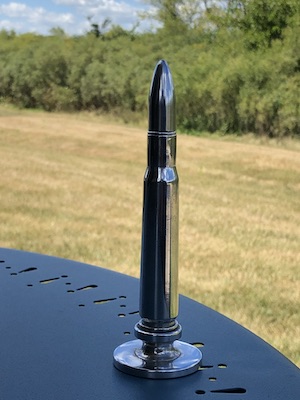
This is a stylized bullet used in aircraft machine guns during World War II. By 1940 my grandfather had become a manufacturing production superintendent of a GM plant in Dayton, Ohio that manufactured Frigidaire refrigerators. With the entrance of the US into the war, the Army figured weaponry was more important than refrigerators. They took over the plant and converted it to the manufacture of machine gun bolts to arm aircraft.
When I was quite young, grandpa would tell me stories of how production sucked and a general came to him and gave him the job of turning the plant around and getting production going. The pressure was intense. “We’ve got boys dying over there and we need this support,” he was often told.
By age 10, I had heard (probably several times) about how he had taken a couple of days to stand up on the mezzanine and watch. Then he began reorganizing the equipment and processes to reduce wasted time and motion. And got production up to where it should have been.
He also told me stories of being an apprentice machinist at The Monarch Machine Tool Company making huge lathes and other machinery.
So, I grew up on manufacturing stories. About the lessons he learned when the company sent him to General Motors Institute for classes (not bad for a guy whose step-father wouldn’t let him finish high school).
When I started my career working in manufacturing, I carried his lessons. We were “Lean” before Lean was a thing. If only I were a writer back then…
However
I read many political theorists in graduate school and was deeply affected by reading a short piece by the young Karl Marx on alienation. Marx meant by this that in the days prior to industrialization a craftsman built an entire thing. There was a little piece of “him” in everything he made. It was his creativity, knowledge, skill that went into making something that someone could use for a long time. I knew some craftsmen when I was young. They had little schooling, but they were some of the smartest and most creative people I’ve ever known.
Industrialization and mass production brought with it the assembly line. Men (and sometimes women and children under terrible conditions) would be hired at poor wages. They neither had nor were provided with training for skills needed to build a product. Rather, the people were merely a replaceable component in a big and inhumane system. Marx called this “alienation” as in humans were alienated from the fruits of their labor. Fifty years of labor unrest, protests, violence followed as people protested the conditions. And also how a very few became very rich while almost everyone else lived in poverty.
Seth Godin produced some thoughts on this topic (not Marx, but industrialization) in his latest Akimbo podcast. Listen to this and the prior one on Interoperability to get you thinking about the morals and ethics of what we do.
On the one hand, we who strive to make industrial manufacturing and production better provide much benefit to our societies. On the other hand, we need to take care to consider the effects of what we do on people, environment, and society.
I had not intended it since I’m not much of a holiday type of person, but these thoughts seem to go along with the US celebration of Labor Day this weekend. I hope you have a happy and safe one.





